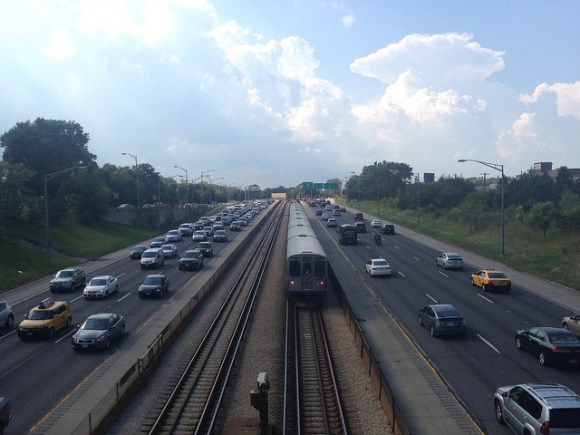This week active Transportation Alliance released its 2018 Regional Mode Share Report. Some of the troubling stats from the study include:
- A higher percentage of Chicago area residents are driving to work today compared to 1980.
- While the region’s population has increased by 18 percent since 1980, the total amount of driving in the region grew by 66 percent.
- Between 1996 and 2015 the Chicago area added more than 1,000 miles of news roadways at a cost of billion with the goal of decreasing traffic jams, but this has only increased congestion, pollution, crashes, injuries, fatalities, and disease associated with sedentary lifestyles.
They note that highway expansion has also increased sprawl, making it more difficult for people who can’t afford cars or are physically unable to drive to access jobs and other destinations.
In conjunction with the report, Active Trans is calling for a moratorium on expressway widening in the region. The Bruce Rauner administration is planning on expanding I-294 (the Tri-State Tollway), I-290 (the Eisenhower Expressway) and I-55 (the Stevenson Expressway) at combined cost of $7.4 billion. The advocacy group is asking residents to send a letter to the governor asking him to put the brakes on the plan by removing these projects from the Illinois Department of Transportation’s Statewide Transportation Improvement Program (STIP).
They’re also asking him to adopt a policy acknowledging that road expansion creates “induced demand” – when more space is made available for cars more people choose to drive, nullifying the congestion benefits. And they’re asking the governor to invest the money that would be spent on widening the expressways to sustainable, lower-cost traffic solutions, such as increasing transit service and converting existing highway lanes to carpool lanes. They note that the hundred miles of bike lanes Chicago installed during the first five years of the Emanuel administration cost only $12 million – less than one-six-thousandth of the price of the three highway expansions.
Active Trans also sent letters to the Chicago Metropolitan Agency for Planning and the Illinois Tollway Authority asking for the removal of expressway widening projects from CMAP’s ON TO 2050 regional plan and the tollway's Move Illinois Capital Program.
(Today is the last day for the public to weigh in on ONTO 2050. Let CMAP know you support removing expressway expansion projects from the plan out via a form at http://www.cmap.illinois.gov/onto2050 or by email at ONTO2050@cmap.illinois.gov.)
In an editorial published today, the Sun-Times agreed with some of Active Trans’ arguments, noting that the region “sorely needs a better network [for] buses, trains and bicycles.” But they also made the retrograde argument that if we don’t widen roads and build new ones, we’ll be improving sustainable transportation “at the expense of leaving cars stuck in traffic jams.” The paper doesn’t grasp the concept that, due to induced congestion, whether we expand the highways or not, drivers will still be mired in congestion – the experiences of the last several decades prove that. They refer to the widening of the expressways as “improvements,” even though they would only result in more traffic jams, smog, and other negative outcomes, in addition to wasting billions.
The thing is, the Sun-Times understands most of what’s at stake here. “The Chicago region is, indeed, too dependent on automobiles, much more so than metro areas like New York and Washington,” they write, noting that Active Trans reports that about 36.5 percent of Chicagoland workers commute by transit, walking, or biking, compared to 67.7 percent in the New York region and 54.3 percent in the D.C. area. “After investing huge sums year after year on building new and wider roads, the Chicago area still has some of the worst traffic congestion in the country.”
The paper also acknowledges that our region’s car-dependence contributes to climate change and increases transportation costs for low-income residents. They note that poor transit access contributes to unemployment, which in turn contributes to violent crime, and that transit has been “woefully underfunded” here for many years.
All the same, the Sun-Times claims that Active Trans’ sensible call for ending the vicious cycle of road expansion, induced demand, congestion, and more road building in favor of investing in transit, walking, and biking “takes it too far” and is “extreme.” The paper argues that a “more real-world solution” to congestion would be to move forward Rauner’s proposal for “managed lanes” on the Stevenson and the Eisenhower. These would be open to buses as well as private drivers who pay a toll, which would be raised as the lanes fill up to maintain free-flowing traffic.
Converting existing lanes to managed lanes would make sense and, as Active Trans has noted, be relatively inexpensive. But widening the roads to add the tolled lanes would cost billions, and it would lead to a net increase in driving, and all the ills that go along with that.
Perhaps the leadership of the Sun-Times will understand this principle in a few years. But hopefully Active Trans’ campaign will have been successful bt then, so that the Chicago region won’t be dealing with the fallout of having three super-sized expressways.





